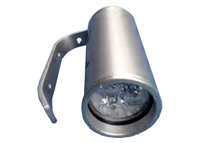Dive light

Whether diving in the night, in dark water or exploring caves or wrecks the dive light is a necessary part of the equipment. Underwater photographers need special lights to make the original colors of coral and fish visible, as due to the absorption of light the colors "disappear" already in a few meters depth.
Dive lights come in different styles and sizes and with different options. They are offered with rechargeable or disposable batteries, different types of bulbs, for example Xenon or LED and different beams.
Basically, there are two types of lights: Torches and canister lights.
Torches have a pistol or lantern grip which contains the batteries. If they are used as primary light source they are typically larger and have wide beams, the smaller, more compact ones commonly used as secondary (back-up) light provide a narrow beam.
Canister lights are compact devices, connected via wire to the battery housing (canister). This housing is separately worn on the waist or fixed on the tank of the diver. Like this it is more convenient to carry their larger batteries, which can supply more power than the small ones in the grips of the torches.
However, by the advances in lighting technology nowadays you can find already small and powerful lamps as well.
To choose the right light, the diver has to consider his needs (kind of dives) and environmental factors.
If the diver needs a light very rarely, he might decide for disposable batteries. Most frequent divers prefer lights with rechargeable batteries. Even if they are more expensive, they save money on batteries and many of them perform better than with disposables. The most important requirement of a dive light is its pressure resistance and water tightness.
To avoid flooding of the light, the sealing rings require proper maintenance. They have to be cleaned and greased carefully.
To get advice ask the instructors, or share your opinions with other divers in the diving equipment forum.
Look at the diving center directory to find a dive shop or diving center in your region.
All information and opinions provided are general and no substitute for professional advice. Always check with your diving instructor what fits best to your personal needs and to your level of training.











